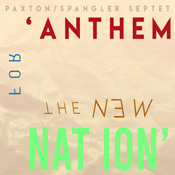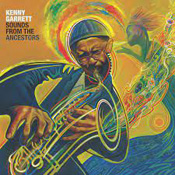Recent Recordings by Area Artists
The Paxton/Spangler gang, in various incarnations, has been carousing its way through much of jazz history, leveling out its chronological development by exploring its essential ludic, spiritual, and rhymical unity. From Billy Strayhorn to Bennie Moten and Count Basie, from Louis Jordan to the basic blues, with Sun Ra always lurking, they now return once again to the jazz of the South African townships in the form of the Paxton/Spangler Septet’s release Anthem for the New Nation (Eastlawn ELD 036), an exploration of the music of Abdullah Ibrahim (Dollar Brand). Spangler has immersed himself in African jazz for decades, having played in such groups as the Sun Messengers and the Sun Sounds Orchestra and then playing the music with his own PD9 Township Jazz Project, resulting in two marvelous CDs. Here, the Septet and guests consists of Tbone Paxton, trombone; RJ Spangler, congas, percussion (both co-leaders); Daniel Bennett, tenor sax; Rafael Leafar, alto sax and flute; Phillip J. Hale, piano, Fender Rhodes electric piano; Jeff Cuny, electric & acoustic basses; with Kasan Belgrave, alto sax; James O’Donnell, fluegelhorn; and Damon Warmack, electric bass on one track each.

Abdullah Ibrahim comes from Cape Town and after taking part in the first-ever jazz recording by a South African group, the Jazz Epistles, he left the apartheid of the country behind and moved to Europe, where, with the help of Duke Ellington, he was able to perform and record, eventually moving to the U.S. and then back to Africa. Over the years he as well as Hugh Masakela presented two very different faces of exiled “township jazz.” On this album, the Septet presents tracks judiciously selected from Ibrahim’s long career, focusing on some of his classic early work. More than half derive from one of his best-known records, African Marketplace (1980). Ibrahim writes beautiful, lilting melodies that make one sway and dance, but they often have a slightly melancholy tinge to them that is well marked by the Paxton/Spangler group. The choice of compositions brings attention to Ibrahim’s political and humanitarian voice, as it includes such tunes as “Soweto” and “Anthem to the New Nation,” and most importantly “Mannenberg,” which he composed in 1974 together with the celebrated South African tenor saxophonist Basil Coetzee, who was one of the African people forcibly displaced from District Six in Cape Town to the slums of Mannenberg. The song quickly became a rallying cry against apartheid, racism, and oppression; legend has it that it inspired Nelson Mandela in his jail cell. Ibrahim would eventually play at his inauguration after liberation and in an interview reported that Mandela came backstage and told him “Bach and Beethoven, we’ve got better.”
This recital of Ibrahim’s music is bookended by two of his most expressive and lilting compositions, “African Marketplace” and “Soweto.” On the first one, the septet demonstrates quickly that they have mastered the township jive, that lilting swing that has propulsion but is not aggressive; they then up the excitement on the Middle Eastern sounding second strain, and once then turn it on even more for solos by Bennett and Cuny but take it down a bit with Hale’s Rhodes outing. Ibrahim has always had close relationships with saxophonists (he himself plays soprano), and characteristically this music has many featured spots for Bennett and Leafar. The latter shines on alto right away on “Anthem,” where his expressive tone and harmonic sophistication are on full view. Bennett acquits himself perfectly on “Mannenberg,” which is no mean feat, as Coetzee’s solo on the long original version of the tune became a classic in South Africa, one that every aspiring tenor saxophonist had to master. Bennett pays tribute to the man from Cape Town, but makes it his own, demonstrating once again his instrumental mastery.
By the time we get to the slower, lilting, wistful “Moniebah,” the two saxophonists take a rest and saxophonist Kasan Belgrave takes their place, adorning it with a lovely idiomatic solo, followed in turn by succinct statements by Paxton and Hale, leading to thoughtful exchanges by the three soloists to end the tune. The recital ends with the irresistible vamp of “Soweto,” where the pianist lets loose in tribute to the composer and James O’Donnell, who so often co-leads groups with Spangler, weighs in with a spirited fluegelhorn solo to provide still another voice to the band.
Paxton, Spangler, and their fellow musicians pay tribute to the unique melodic, emotional, as well as spiritual, humanistic, and political world of Ibrahim’s music in a manner that is respectful but not overly imitative. The solo powers of all the members of the septet and their guests give it all another dimension, but perhaps most admirable is the instinctive understanding that they seem to have of the distinct township rhythmic drive that animates this music. The recoding is magnificent, but I cannot wait to hear them play this in public.

Turning to expatriates, mention should be made of saxophonist Kenny Garrett’s Sounds from the Ancestors (Mack Avenue, MAC1180), together with his working band of Vernell Brown, Jr., piano; Corcoran Holt, bass; Ronald Bruner, drums; and Rudy Bird, percussion, augmented throughout by additional musicians. While the Paxton/Spangler group focused on the work of one performer/composer, Garrett here pays homage to the whole gamut of the musical culture of Africans and the African diaspora that molded him, including Afro-Cuban rhythms and chants, gospel, R&B, as well as tributes to his old friends and mentors, Roy Hargrove, Art Blakey, and Tony Allen.
The eight songs vary in musical approach and are encircled by two versions of the relaxed Afro-Cuban patterns of “It’s Time to Come Home,” mainly featuring the sweet sounds of Garrett’s alto (with reference to John Coltrane), moving into sax riffs and then bleeding into a chant (on the first version only), which I believe is in Yoruba, the West African language that has been used in religion and music by African Americans in the Caribbean and elsewhere in the Americas. From there we move on to a poppish “Hargrove,” written for his late friend, that has a pronounced R&B backbeat and background vocals, including a guest appearance by trumpeter Maurice Brown, which also turn up on the gospelish “When Days Were Different.” Throughout, Garrett seems in a laid-back mood, offering a good exposition of his sweet alto tone. By the time we get to “Sounds from the Ancestors,” the tune begins with solo melancholy piano that seems to tip a hat to Abdullah Ibrahim, eventually morphing into a wild, complex set of references, including African singing, Coltranish saxophone riffs, with the leader offering his most spirited blowing on the album, blending with some exciting chants, ending, as it began, with unaccompanied piano. Apparently Garrett was keeping the best for last, as for this listener this penultimate track is definitely the high point of the album.